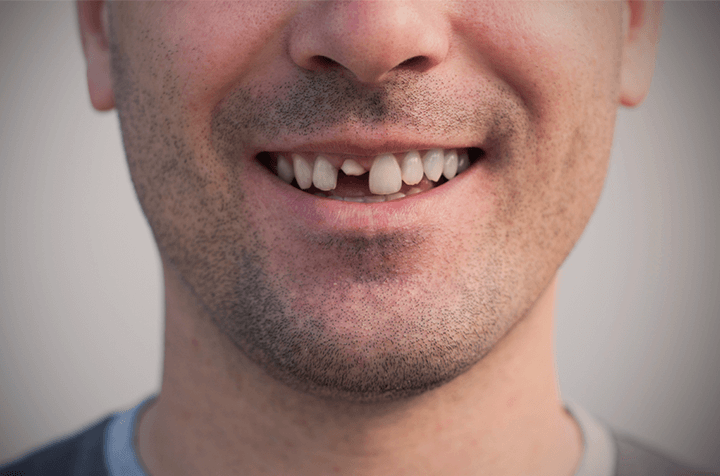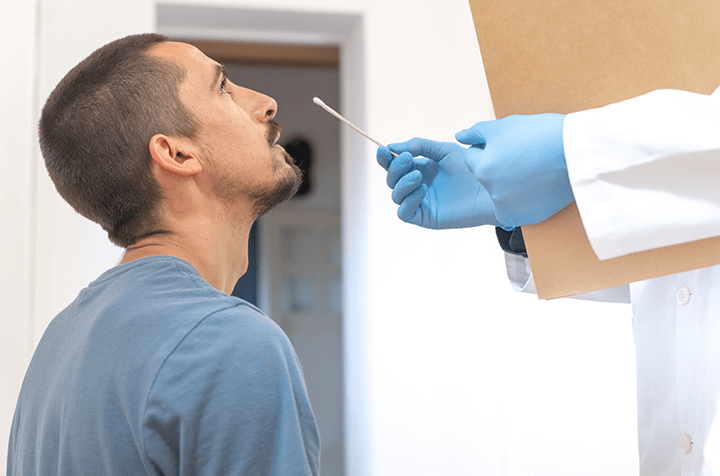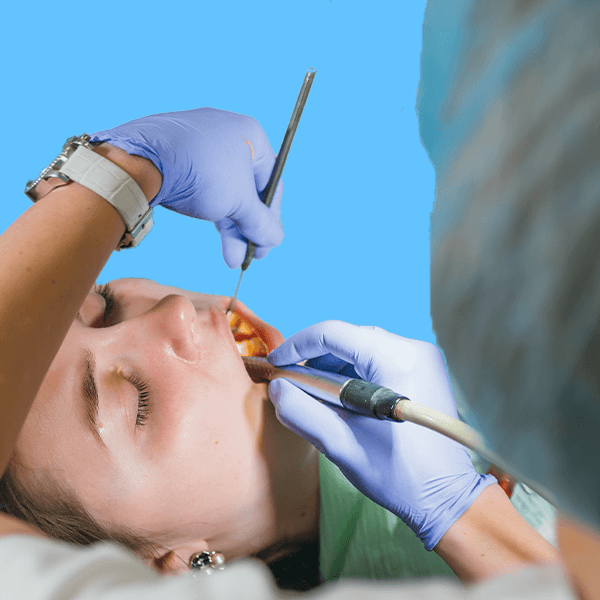Don't let a damaged tooth ruin your smile, root canal treatment can help restore your oral health. Say goodbye to tooth pain and hello to a healthy smile with root canal treatment!
Book your consultation
When a nerve of a tooth or tooth core is diseased or injured, the repair of it calls for a root canal treatment. Due to decay, repeated failed dental treatments, crack on the tooth caused by an accident or injury may be the reasons why you may need a canal root treatment. If not treated, these conditions can cause infection in the soft tissue and can become a bigger problem, and you can lose your tooth.
Learn MoreRoot Canal Treatment can treat multiple problems and many people are good candidates for it. Here, you can find answers for different complaints.

It is always preferable to keep your natural tooth.

The procedure is only as painful as getting a filling.

If you delay it for too long, you may lose your teeth.
At Clineca, we take everything seriously. We understand how important the results are for you. We care about your health and comfort as much as you do. From beginning to end, we inform you, guide you, serve you, and help you.

Surgeries are performed in prestigious fully equipped hospitals in which doctors from all specialties are present.

You will have an online consultation with your surgeon via video chat. After an online examination, and will help you to choose what's the best.

We cooperate with the surgeons who perform a limited number of surgeries each week to ensure the best results.

You can contact our agents 7 days and 24 hours for your questions and concerns, or only support. We'll be fully available for your service.

We provide you with special discounts in luxurious hotels in the vicinity of the hospital. Your comfort is very important to us.

We provide airport transfer and transportation between your hotel and the hospital before/after the surgery via VIP vehicles.

As Clineca, we provide you with patient accompaniment, who will visit you every day in your hotel room during the resting period.

The price includes fees of the surgeon, operating room, hospitalization, tests, medications and medical visits by a nurse.

The price includes hotel layover (including breakfast), and transportation between the airport, the hotel and the hospital.

Interpreter service, BBL pillow, neck pillow (rhinoplasty), eye mask, voltage converter and many others that will enhance your satisfaction.

Turkey is a leading player in medical tourism, and Istanbul, which is an extremely beautiful touristic city, is the plastic surgery capital of Turkey.
Clineca has a holistic approach. We believe that everything should be right for a satisfactory cosmetic surgery experience, including your days in Istanbul. We plan every detail of your journey.
After you fill the form, one of our agents will contact you. They will inform you about the whole experience, in detail. If requested, they will arrange an online consultation for you.
You'll have an online consultation with your surgeon via video chat. They will perform an online examination and help you to choose what the best approach to your case is.
We'll plan your whole journey including your surgery date and accommodation. We'll inform you about every need; from preparing your suitcase to advice before the procedure.
Our VIP transportation vehicle will be ready at the airport for you. We’ll drive you to the hospital and they'll get a blood and the C19 test. Then, we'll take you to your hotel.
We’ll take you from your hotel to the hospital. After your examination, the same day you’ll have the surgery. You will stay at the hospital 1-2 day(s), depending on the procedure.
After your stay at the hospital, we'll drive you to your hotel. A wellbeing assistant will visit you every day to inform you, to examine, and to provide medical care during the week.
We'll gladly and proudly show you around our beautiful city. We’ll be very happy to provide you with professional guidance in historical sightseeing, shopping and entertainment.
We’ll take you to 1-week follow-up. After your examination and removal of bandages if required, we’ll inform you about the recovery period. Then, we'll drive you to the airport.
During your recovery, we'll inform you, check on you, and answer your questions 24 hours and 7 days. We'll expect you to send photos periodically to follow your recovery period.

If you are in good health, and have a toothache that doesn’t go away, you can have the treatment which will help ease the pain while regaining your smile back.
If your mouth is too small to work in, your tooth is too severely decayed, your bone structure and gums are weak, or your tooth root has cracked or is curvy, removal of the tooth might be a better treatment option.
Learn MoreThe outcomes of Root Canal Treatment can be analyzed in three main categories: aesthetical, health-related, and psychological.
The tooth may be slightly darker in color after the pulp has been removed, but this can often be addressed with a tooth-colored filling or crown.
The health-related outcomes of root canal treatment refer to the overall health of the mouth and the treated tooth. Root canal treatment can help remove infection from the inside of the tooth, which can help prevent further damage to the tooth and the surrounding teeth. It can also help reduce pain and improve oral function.
The procedure is typically not painful, and most patients report feeling relief after the procedure is complete. The success rate of root canal treatment is high, which can help alleviate anxiety and promote a sense of well-being.

The surgery usually takes under an hour. Depending on the presence of infection or abscess there may be a need for another or two more sessions.

During the first visit to the dentist, your dentist will locate the pain, check the changes in the color of the tooth, presence of abscesses and visible evidence of infections, and in some cases may even take an X-ray to confirm their diagnosis.
Your endodontist (dentist) will apply local anesthesia to the nerves surrounding the affected tooth. Then a dental dam or suction will be placed to keep the area clean and dry while the dentist works carries on the operation. A small hole will be drilled into the top of the tooth to enable the dentist to reach the infected pulp. Then through the hole, the dentist will carefully remove the pulp usually via a file. After the pulp is removed, the dentist will clean and disinfect the area to prepare it for filling while preventing any further infection.


A small hole will be drilled into the top of the tooth to enable the dentist to reach the infected pulp. Then through the hole, the dentist will carefully remove the pulp usually via a file. After the pulp is removed, the dentist will clean and disinfect the area to prepare it for filling while preventing any further infection.
The space will be filled with a biologically similar (to the pulp) material called gutta-percha, which will support the tooth for the rest of your life. The material gets heated first to make it pliable, then pressed into the empty space that has been prepared.


After the pulp is replaced with gutta-percha, the hole will be covered with a temporary filling. You may want to replace it with a permanent restoration like a crown later. The crown placement doesn’t take place in the same operation because the affected tooth may become weaker in some cases and may need extra support inside the root chamber, requiring an operation. Also, crowns are not needed for all the teeth, front teeth or canines do not require crowns after root canal treatment, but as they play an important role in chewing, molars and premolars require crowns.
After the surgery you may go home with your prescription for antibiotics. If you are prone to infections or the infected tooth was severely infected, your dentist may require you to come to the office to make sure the infection has dissipated completely.

Every medical treatment comes with a set of risks and complications. Root Canal treatment can have these possible complications:
After the operation you can drive to work, school or home as local anesthesia is used and will not cause any problems. In a few days, the sensitivity and discomfort associated with the operation in the operated area will subside. You should take the antibiotics your dentist prescribed, regularly. You should keep good oral hygiene in order to prevent any further infections.
Over the counter painkillers should help with the pain, your dentist may even prescribe some. If the pain becomes severe and doesn’t go away with painkillers, you should make an appointment with your dentist for an examination. You can brush and floss your teeth regularly. Due to sensitivity in the area you may want to avoid chewing hard foods or may want to chew on the other side of your mouth. Tooth color may change over time for some people. It may be caused by internal bleeding in the tooth which stains the tooth and causes discoloration. You can have whitening done if you’d like to.
After meeting with your dentist at their office during your consultation you express your expectations and the dentist checks the condition of your teeth. They will inform you about their professional opinion while taking your expectations and the condition of your teeth into consideration. Then, photos of your teeth will be taken for a 3D simulation. The size, model and color can be decided by you, and you can even choose the color from the tooth color chart. After deciding, on the first operation day teeth will be scraped and if there is a need for an extraction it will also take place on the first day. Temporary veneers will be put on and your dentist will prescribe you with painkillers and antibiotics. You will stay at the hotel for about 4-5 days. During your stay you will be visited by a wellbeing specialist, and if you’re having any problems your dentist will be contacted. After these 4-5 days, your permanent veneer will be applied and it will be all done.

If you have been recommended for root canal treatment, there are a few steps you can take to prepare for the procedure and ensure a successful outcome.
Your dentist will provide you with instructions; but in general:

We know you have many questions. Having realistic expectations and deciding to have a dental operation requires information. Here you can find answers to frequently asked questions about root canal treatment.
Root Canal Treatment can treat multiple problems and many people are good candidates for it. Here, you can find answers for different complaints.